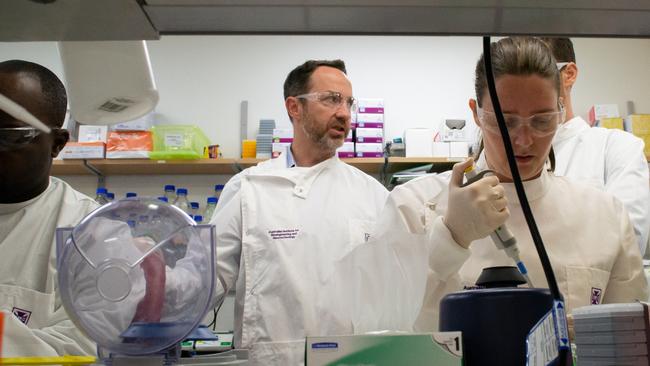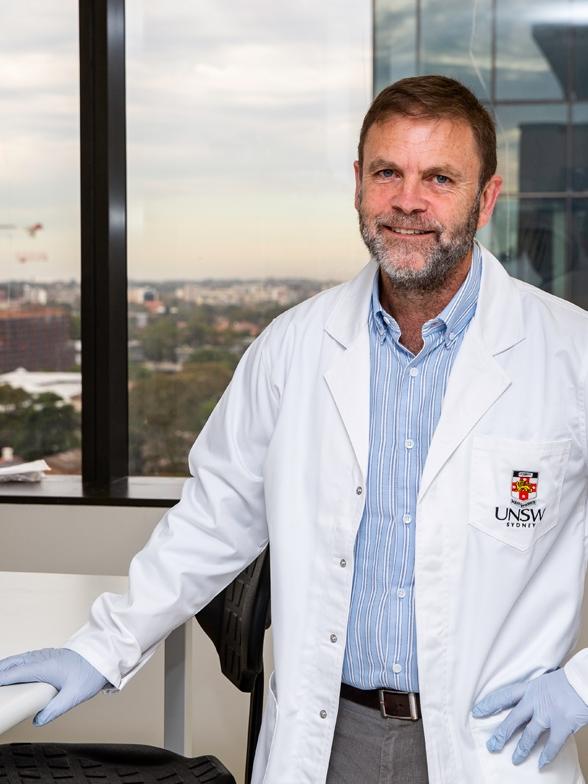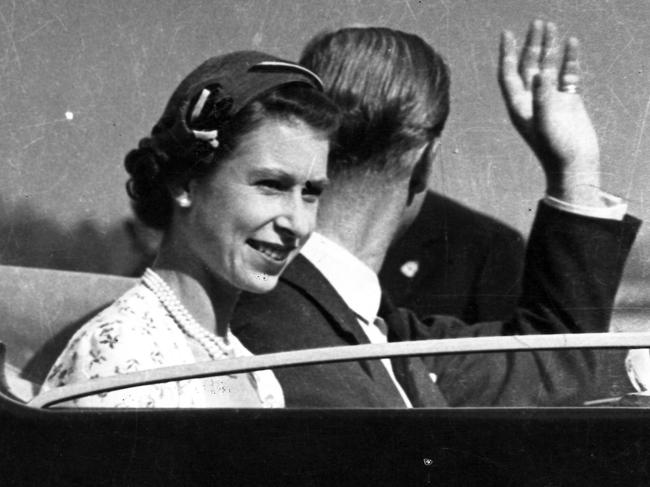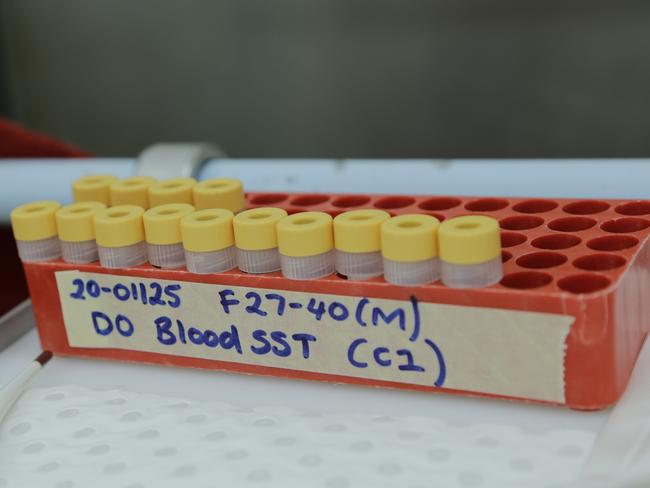Aussie teams join worldwide efforts to find vaccine, trial drugs for COVID-19
Aussie scientists are part of a worldwide effort to find cures and treatments for the coronavirus. With the tally of infections passing 2 million, the high-stakes race has been likened to the Apollo Mission moonshot.
- Aussie boffins in the global hunt for coronavirus vaccine
- Greg Hunt: How we’re leading the race for a vaccine
The high-stakes global race to find a cure for the coronavirus as its tally of infections passes the 2 million mark has been likened to a modern-day “moonshot”.
But while the international mission has led to unprecedented clinical collaborations between scientists around the world, the obstacles to such a breakthrough — likened to the Apollo mission moonshot — and its distribution to billions around the world now have many health experts looking at two other traditional lines of defence against the deadly disease until the silver bullet can be found.

That includes using existing antiviral drugs and also trying well-established plasma therapies — harvesting antibodies from the blood of recovered patients, such as Bondi survivor Cade Turland, who has put his hand up to be “pulled apart” to help others despite losing 8kg in his battle with the killer virus.
MORE CORONAVIRUS NEWS
PM: Three ways Australia will ease COVID-19 restrictions
Plant that makes COVID-19 treatment delays closure
Damning new evidence in China COVID cover-up
Medical experts say those treatments will effectively “build a bridge” to the time when a COVID-19 vaccine comes along.
Associate Professor Greg Fox, research leader at the Woolcock Institute in Sydney, said it was still vital to keep working on a cure to deal with the virus as well as a vaccine to prevent it.
“Around the world, health services have realised we need to do as much research as possible. It is a new disease and we are all starting from scratch,” he said. “We have still got to learn a huge amount about it — both how to treat it and how to prevent it.”
While at least 35 teams around the world are in the race to make a vaccine, researchers say it is still important for Australia to develop its own, because it will undoubtedly take some time for an overseas vaccine to become available here, given the high demand caused by the global nature of the pandemic.
In a milestone development, the CSIRO is running preclinical trials of both a nasal spray and an injection of vaccines on ferrets in its animal labs in Geelong.
In Queensland, a crack team of at least 20 researchers from the University of Queensland is already testing two vaccines in clinical trials and checking another 42 possibilities.

In Sydney, the Westmead Institute for Medical Research and Sydney University are working together on vaccine for older people with weaker immune systems.
“We are in the process of collecting cells from recovered COVID-19 patients to test a number of selected viral proteins (key parts of these viral proteins) and adjuvants (immune stimulants) to determine the cellular immune response to these immuno-therapeutic combinations,” Professor Sarah Palmer says.
In the US, the world’s biggest healthcare company, Johnson & Johnson, also plans to have an experimental vaccine ready for human testing in September by increasing manufacturing capacity even before safety and efficacy tests are run, under an extraordinary $1 billion partnership with a US government agency.
“This is a moonshot for us,” chief executive Alex Gorsky said.


But until that “space race” mission becomes a reality, the two major medical treatments to combat coronavirus remain the kind of antiviral drugs used to fight the Ebola virus and the immunotherapy techniques used to keep Britain’s royals safe from polio during the 20th century’s global outbreak.
While normally healthy immune systems fight off viral infections, antiviral medicines are used to stop the replication of a virus — in effect cutting the symptoms and shortening the disease.
Promising drugs being tested in the antiviral realm include the anti-HIV drug lopinavir, chloroquine — traditionally used to fight malaria and the focus of panic buying after a recent Donald Trump endorsement — and remdesivir, developed in the mid-2010s to fight ebola.

The second promising source of drug treatment is “immunotherapy” — harvesting the blood of a recovered patient who has made natural antibodies while fighting the illness.
It’s what the Queen was injected with to protect her from polio in the 1950s while touring Australia: blood plasma, then called the gamma globulin, which was taken from polio survivors.
These days the antibodies are concentrated and screened before use.
Last week China published a study showing how five critically ill patients with COVID-19 treated with plasma all improved.
Professor Anthony Kelleher, director of the Kirby Institute at the University of NSW, says the institute has spent the past month “retooling” its labs to make them safe to work with the virus.

The Garvan Institute will produce antibodies and screen them, then the Kirby Institute will do lab tests to see if it can stop the virus getting into cells.
“In the end, the vaccine will be very important because it is prevention and prevention is better than cure — but hopefully some of these other approaches will provide a bridge to that vaccine,” Dr Kelleher said.
The use of transfusion therapy against COVID-19 may still be some way off, but the case of recovered coronavirus patient Cade Turland could offer hope.
The Bondi man said he was willing to donate blood plasma to help researchers save lives — only for NSW Health to turn him down.
The 32-year-old immediately self-isolated at his family home in the Southern Highlands after catching an emergency flight back from Italy — one of the countries hardest hit by coronavirus — last month, and lost 8kg during his battle with the deadly disease.
Before emerging from quarantine, Mr Turland offered to join the many “superhero survivors” in China, the US and Europe donating their antibody-rich plasma for research and treatment, but was refused by the state’s health body.
“I was like, ‘why? I’ve got antibodies floating around in my blood, you should be here the day I get better, taking a pint!’,” he said.
“Put me on the list for taking my blood and pulling me apart if you need. Make me useful.”
Mr Turland said he was told that local health authorities were not yet exploring transfusion therapy in the fight on the ground against the infection.
The entrepreneur caught one of the last flights out of Milan in early March after cutting his holiday short when a small cluster of cases in the Lombardy region exploded in a matter of days.
At first during his quarantine, Mr Turland was hiking around his family’s bush property, but things soon turned more serious when he developed a fever and exhaustion.
“Imagine feeling 10 per cent worse each day, and that compounds pretty bad until day seven and eight when you get smashed,” he said.
